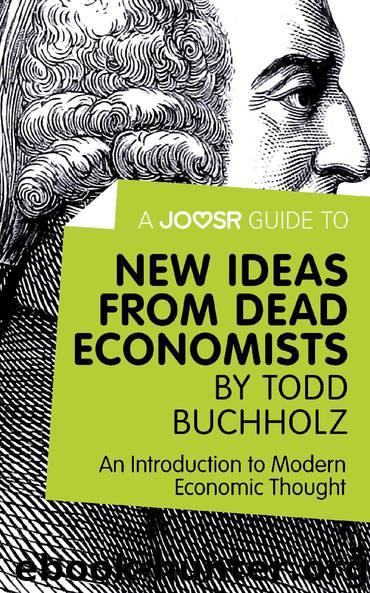New Ideas from Dead Economists by Todd Buchholz

Author:Todd Buchholz
Language: eng
Format: epub
Publisher: Joosr Ltd
Keynes and spending your way out of a recession
In times of economic downturn, people often limit their spending and put money aside in case the situation gets worse. However, this might be the worst thing for the economy. According to Maynard Keynes, who developed Keynesian economics when trying to comprehend the Great Depression, saving rather than spending can have immense influence across society, causing a recession to quickly spiral further and further out of control.
During a recession, people lack both money and security: they don’t know how long they’ll have their jobs or whether they’ll be able to put food on the table or keep up their rent payments. Naturally, people often save money in such situations: if you fear you may lose your job and not find another one, then it makes sense to have some reserves to survive on in case of disaster. However, Keynes argues that this contributes to a chain reaction that causes the economy to nosedive further into recession.
When people save money instead of spending it, they purchase fewer products and services. As demand for these things declines, companies and merchants make less money. Faced with declining profits, they make existing workers redundant and don’t invest in developments and expansions that could provide new jobs. So both unemployment and fear of unemployment increase, causing people to further limit their spending, and the whole process repeats, on and on, slowing the economy and worsening the recession.
Keynes believed the only way to halt this is to get the public buying more goods and services, and get businesses investing and expanding. Controversially, he also advocated increased government involvement to jumpstart the process, arguing that maintaining government spending and cutting taxes can get a sluggish economy moving again, even if it does cause short-term deficits in government budgets. This idea has been criticized by those who favor the free market and oppose government intervention, but it has also been highly influential. Following advice from the IMF, the governments of the G20 adopted Keynesian policies of tax cuts and high public spending to help the global economy recover from the 2008 financial crisis. Similarly, in 2009, Barack Obama signed a recovery plan that would dedicate $787 billion to public spending intended to steer the United States economy away from recession.
Although it seems sensible, Keynes argues saving money during a recession can actually make the recession worse: people putting something away for a rainy day may actually cause the rainy day to occur. Instead, it’s actually better for everyone, from individuals to governments, to increase expenditure, kick-starting the economy and spending their way out of recession.
Download
This site does not store any files on its server. We only index and link to content provided by other sites. Please contact the content providers to delete copyright contents if any and email us, we'll remove relevant links or contents immediately.
International Integration of the Brazilian Economy by Elias C. Grivoyannis(111057)
The Radium Girls by Kate Moore(12026)
Turbulence by E. J. Noyes(8047)
Nudge - Improving Decisions about Health, Wealth, and Happiness by Thaler Sunstein(7706)
The Black Swan by Nassim Nicholas Taleb(7128)
Rich Dad Poor Dad by Robert T. Kiyosaki(6631)
Pioneering Portfolio Management by David F. Swensen(6300)
Man-made Catastrophes and Risk Information Concealment by Dmitry Chernov & Didier Sornette(6019)
Zero to One by Peter Thiel(5798)
Secrecy World by Jake Bernstein(4751)
Millionaire: The Philanderer, Gambler, and Duelist Who Invented Modern Finance by Janet Gleeson(4478)
The Age of Surveillance Capitalism by Shoshana Zuboff(4291)
Skin in the Game by Nassim Nicholas Taleb(4248)
The Money Culture by Michael Lewis(4206)
Bullshit Jobs by David Graeber(4190)
Skin in the Game: Hidden Asymmetries in Daily Life by Nassim Nicholas Taleb(4004)
The Dhandho Investor by Mohnish Pabrai(3764)
The Wisdom of Finance by Mihir Desai(3746)
Blockchain Basics by Daniel Drescher(3580)
